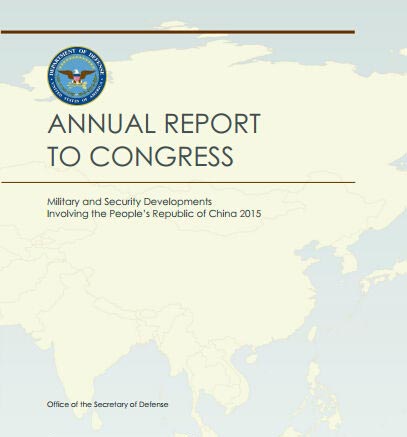US still scaremongering
(China Daily) Updated: 2015-05-12 07:46
 |
|
The Defense Ministry on Saturday expressed firm opposition to a Pentagon report on China's military development and security. |
At a time when the world is celebrating the Allies' victory in World War II in different ways, the United States, as the world's sole superpower, is expected to be sending signals of peace as well. On the contrary, the Pentagon issued its annual report on the state of China's national defense on Saturday, which once again tried to sell the outdated "China threat" theory.
As before, the report casts doubt on China's normal defense building and its strategic plan and points fingers at China's military transparency and cyber and space programs, while turning a blind eye to China's contribution to world and regional peace and stability.
The US' accusations about China's strategic intentions and military transparency are groundless because China has issued eight editions of its defense white papers since 1998 to help the outside world understand its defense policy and why China is obliged to enhance its military capabilities.
It is the US that needs to clarify its military budget, which has been skyrocketing ever since US President Barack Obama announced the "pivot to Asia".
The US, as the world's No 1 military power, is notorious for its hacking and wiretapping, and for keeping military bases worldwide. Uncle Sam owes the world an explanation why, despite playing its self-proclaimed role as global policeman, it is afflicted with ever-growing security concerns?
In fact, the real purpose of the Pentagon peddling the so-called China threat is to justify its own military ambition. For example, the report's allegation that China now has "the most dynamic space program in the world today" may be intended to divert attention from its own extra spending on military and spy satellites over the next five years.
The biased report is a disservice to the currently good momentum in China-US military-to-military exchanges, which play an important role in building a new type of major-country relations.
It should also be noted that the Pentagon has devoted one special section in its report on China's dredging and island building in the South China Sea, which is a blatant interference in China's internal affairs, as China's construction and maintenance works are on islands and reefs in waters over which it has sovereignty.
Yet for decades, the US has chosen to ignore countries such as the Philippines and Vietnam illegally seizing and occupying islands and islets in the South China Sea that are Chinese territories. Such double standards and partiality have clearly emboldened these countries to encroach upon China's territorial interests and raised tensions in the waters.
The US needs to abandon its Cold War mentality and adopt an objective and rational approach to China's defense development.











